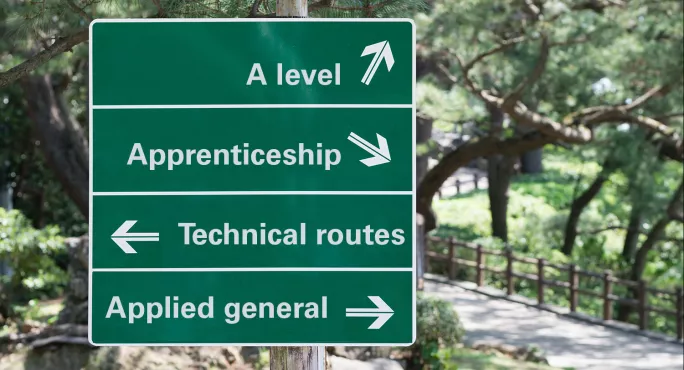We’ve heard lots of warm words from Theresa May’s government about a country that works for everyone, so I’ve been thinking about what that should look like for young people making their post-16 choices. At the moment, too many learners simply do not get the support they need to understand the options open to them.
That’s not the only issue, though, because there are huge pressures on Year 11s as they confront what they are often told is “the most important year of your life”. All too frequently, this isn’t just about exam success. During that same year, they also have to make a perhaps career-defining choice between A level, applied general, apprenticeship and technical routes across a range of providers.
Huge pressures on Year 11s as they confront ‘the most important year of your life’
At the tender age of 15 or 16, this choice feels enormously important, yet there is so little chance to experiment and trial things beforehand. The decision is also unfairly loaded towards one better understood path: it’s apparent that anyone heading for a good set of GCSEs is strongly encouraged, perhaps even pushed, into A levels and probably higher education.
This has many implications, not least that lots of young people in our system drop out of A-level courses at the end of Year 12 because they find that this route is not for them. The wider issue is that it perpetuates the perception that the “best students” should not opt for a technical path or an apprenticeship.
‘Meaningful opportunities to experiment’
What I want to see is more young people being able to make informed choices, with meaningful opportunities to experiment before a final decision. That way, more young people would enter adult life with the confidence, learning, skills and motivation to flourish. To achieve that, progress needs to be made in three areas: information, experience of work and the duties of the new Institute for Apprenticeships.
Better information about the technical and apprenticeship routes is a clear requirement, which the proposed reforms in the Sainsbury review would help with. Fewer, broader and clearer career paths, with better understanding of jobs and progression, would provide a strong platform for choices, but that’s not enough. Young people need to understand not just the choices and the routes, but also what each will be like for them - how they will learn, the environment they will be in, how they will be treated - as well as the potential outcomes they might expect: further study, careers, earnings.
Young people need to have more encounters with workplaces
Young people also need to have more encounters with workplaces, jobs and adults doing different things. All the research shows that first-hand experience is equally critical in helping people to positively choose an occupation as it is in helping them to reject one. Why are we not enabling every child to encounter workplaces and people doing different jobs from when they start at school? The children of today will work for 50-plus years, yet we are not helping them to learn about their options; that has to change.
Finally, we have the opportunity for a step change with the establishment of the Institute for Apprenticeships, which will take on responsibility for technical and professional education in 2018. Let’s ask the new institute to monitor choices, who is accessing which routes and the outcomes, against simple measures of access, fairness, equality and diversity.
Wouldn’t it be great if decisions taken at 16 were easier because options were clearer, understanding of the routes stronger and fair outcomes for every young person well known and applauded? That would be my definition of a country that works for every young person.
Stephen Exley is away. David Hughes is chief executive of the Association of Colleges @AoCDavidH




